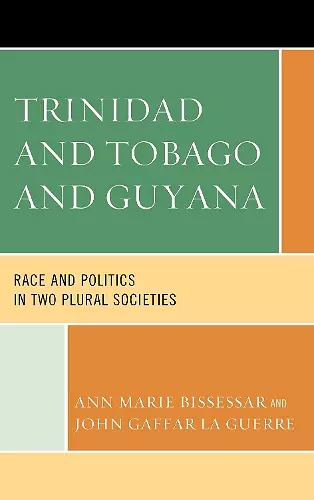Trinidad and Tobago and Guyana
Race and Politics in Two Plural Societies
Ann Marie Bissessar author John Gaffar La Guerre author
Format:Paperback
Publisher:Lexington Books
Published:25th Feb '15
Currently unavailable, and unfortunately no date known when it will be back

In this book an attempt is made to probe more carefully the processes by which social and ethnic problems, as these pertain to Caribbean countries, Trinidad and Tobago and Guyana, are conveyed to the political arena and the mechanisms by which they determine critical outcomes. The authors of this book have accordingly distinguished between predisposing factors and what are described as triggering mechanisms. The factors that trigger dramatic changes will differ between Guyana and Trinidad and Tobago. In short, while in some respects these societies are similar, in others, there are dramatic differences in their respective histories and political developments. This study begins with a survey of the literature on race relations and their connections with politics; it then proceeds to examine the context for the insertion of the two major groups into these societies, the emergence of ethnic groups, and their relationships with political organizations. The nature and politics of the leaders are then analyzed along with the political structures with a view to identifying what factors were responsible for the differing political experiences of both countries.
Bissesar and La Guerre (both, Univ. of West Indies, Trinidad) present a close study of the political-historical interface among social, economic, and international 'predisposing factors' affecting race and politics in the plural societies of Trinidad and Tobago and Guyana. It is too simple to say the book is about ethnicity; rather it is a case study of political/economic development within the complex interplay between forces often anchored in ethnicity. The book methodically traces these factors as they relate to the competition between the culturally East Indian and African factions within the two societies through colonial, independence, and postindependence eras. Outlined are two complex cultural rivers that ebb and flow given the development of each racial, religious, regional, and eventually gender, economic, and political influence. The effect of leadership and structural influences on electoral success of party coalitions proves particularly important for the two countries. The two authors brilliantly explore how the three countries share certain qualities but differ in predisposing factors. The book is an exemplary model of comparative research, demonstrating that there are no simple answers to complex societies. Summing Up: Recommended. Undergraduate, graduate, research, and professional collections. * CHOICE *
Ann Marie Bissessar and John Gaffar La Guerre have provided a precisely observed account of race and politics in Trindad/Tobago and Guyana. While covering the demographic and historical background to race relations in these two plural societies, they lay most emphasis on how governments and leaderships amplified or dampened race conflict. All those interested in the comparative study of ethnic relations will learn much from their well-informed and scholarly treatment of this complex issue. -- Robin Cohen, Emeritus Professor of Development Studies, University of Oxford
ISBN: 9781498511018
Dimensions: 223mm x 153mm x 15mm
Weight: 313g
212 pages